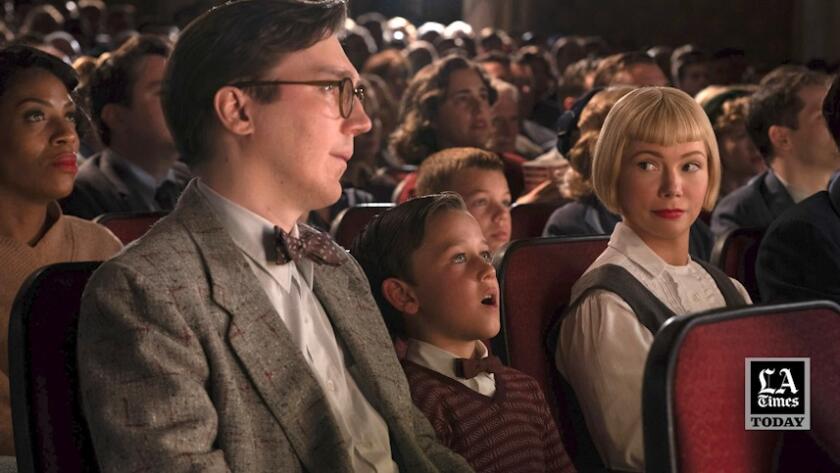Review: Steven Spielberg comes close to a personal best in his luminous ‘The Fabelmans’
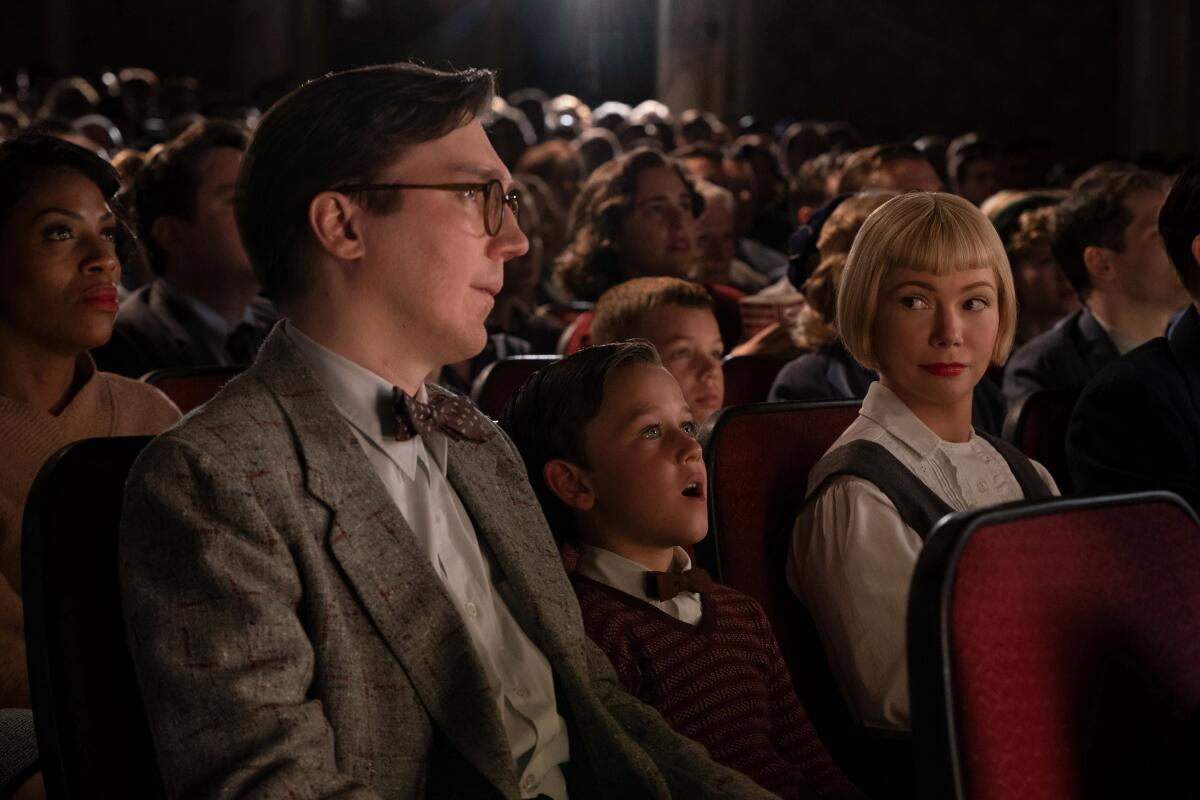
More than once during his fabled career, Steven Spielberg has been dismissed as a technician masquerading as an artist; as the most popular of American filmmakers, the logic goes, he must also be the most impersonal. It’s a judgment that doesn’t quite explain the intensely personal connection a lot of us feel to his movies. Or does it? More than any other director, Spielberg confounds the notion that the personal and the popular, or the technician and the artist, are fundamentally at odds. The intensity of feeling you experienced on your first (or third) close encounter with a Spielberg classic — maybe you levitated out of your seat at “Raiders of the Lost Ark” or had your nerves shredded by “Jaws” — was likely so pure that it felt like yours and yours alone, never mind that millions of moviegoers around the world felt the same way.
And so it’s worth considering exactly what it means to describe “The Fabelmans,” Spielberg’s piercing, rollicking and altogether marvelous ramble through his early years, as his most personal work. That assessment may be correct, if we assume “personal” to be synonymous with “autobiographical,” and also if we overlook the snippets of family history that he’s woven almost subliminally throughout his earlier films. Fire up “1941” and “Saving Private Ryan” and you’ll catch stray glimpses of his father’s World War II stories. “E.T.” and “Close Encounters of the Third Kind” endure not only as wondrous alien-visitation fantasies but as portraits of families in disarray, something that emerged directly from the pain of his parents’ divorce.
For your safety
The Times is committed to reviewing theatrical film releases during the COVID-19 pandemic. Because moviegoing carries risks during this time, we remind readers to follow health and safety guidelines as outlined by the CDC and local health officials.
But “The Fabelmans” — movingly dedicated to Spielberg’s parents, Arnold and Leah — is his first picture to put that particular divorce front and center, along with various other intimate, semifictionalized details culled from his postwar upbringing. He’s grafted those details onto a young alter ego named Sammy Fabelman, first seen as a young boy played by Mateo Zoryon Francis-DeFord. Spielberg, sharing a writing credit for the first time with his regular collaborator Tony Kushner (“West Side Story,” “Lincoln”), rummages through a treasure chest of old anecdotes and memories, stringing together road trips and sporting events, summer vacations and Hanukkah gatherings. There’s a death in the family, a couple of bullies, a memorable first kiss and even a prom-night climax.
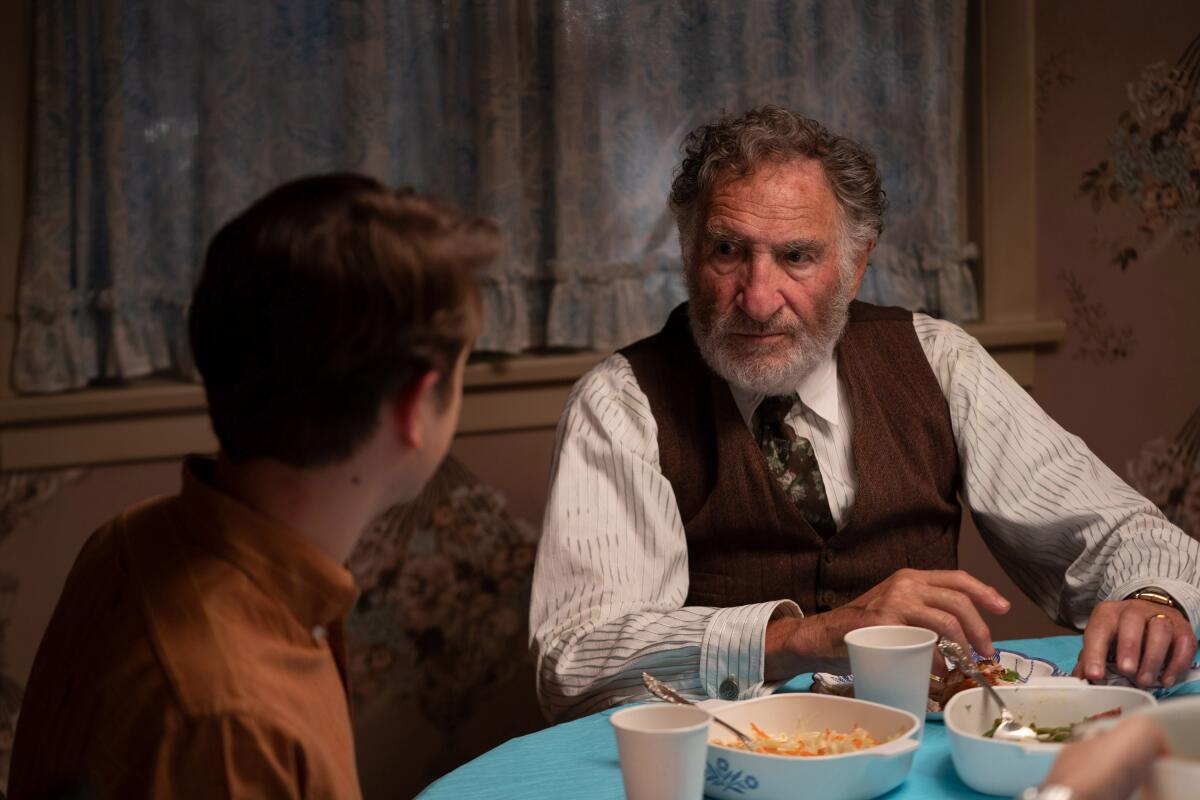
And of course, there are movies, lots of movies, from Cecil B. DeMille’s “The Greatest Show on Earth” to John Ford’s “The Man Who Shot Liberty Valance,” whose wryly memorable axiom (“Print the legend”) provides a clue as to how to approach this alternately truthy and truthful cine-memoir. It’s hardly accidental that Sammy’s story begins with a life-changing trip to the pictures in the early 1950s and finds him wandering a Hollywood backlot more than a decade later. In between, the story zigzags from New Jersey to Arizona to California, tracking the genesis of a young man’s lifelong love affair with the movies — a romance that will prove mutually beneficial, even if Sammy’s obsession comes at a price.
“Art is no game!” roars his great-uncle Boris (a wonderful Judd Hirsch) in a barn-storming, thesis-underlining gem of a monologue. “Art is as dangerous as a lion’s mouth. It’ll bite your head off.” Boris, a former circus performer with the air of an ancient prophet, knows of what he speaks, just as he knows the reckless creative temperament that runs through his side of the family. Sammy’s own mother, Mitzi (a breathtaking Michelle Williams), gave up a promising career as a concert pianist years ago to help her engineer husband, Burt (Paul Dano, beautifully restrained), raise Sammy and his three younger sisters. Burt, heavily in demand from the burgeoning computer industry, keeps his family on the move; Mitzi adapts as best she can, but she can’t hide her resentment and regret over her dashed professional dreams. A similarly unsatisfying fate, Boris declares, might also befall Sammy, whose passion for moviemaking is destined to clash with, and even eclipse, his love for his family.
But “The Fabelmans,” perhaps buoyed by its own Spielbergian optimism, takes a gentler, more nuanced view of this conundrum. From the beginning, Sammy’s family actively nurtures his movie love, and his parents’ distinct perspectives can’t help but shape his own way of seeing. Burt, an electrical engineer, explains movies primarily as a mechanical phenomenon, a science of reels and frame rates; though impressed by his son’s talent, he wishes the boy would pursue something more practical. Mitzi, by contrast, describes movies as “dreams that you never forget” and urges her son to never stop pursuing his own. Sammy’s sisters, for their part, are gleeful collaborators on his early masterworks of 8-millimeter horror cinema, donning toilet-paper mummy rags and squirting themselves with ketchup.
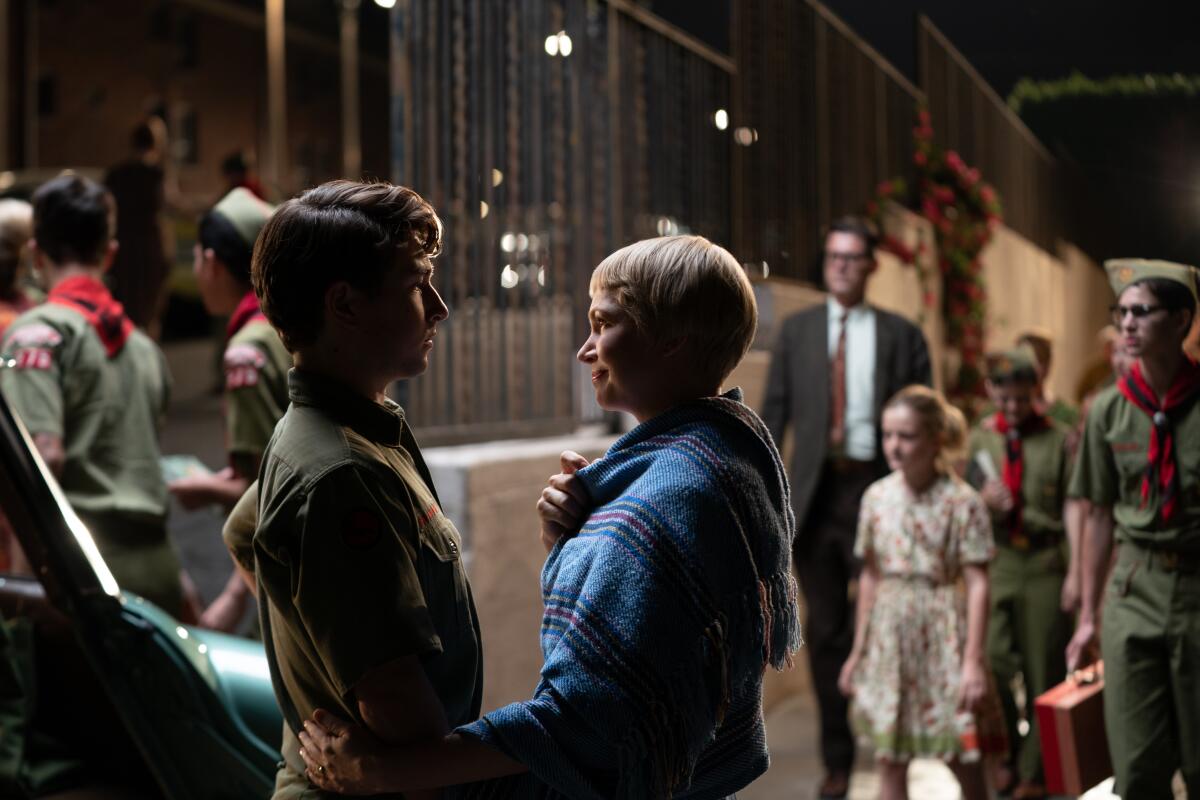
Before long, the Fabelmans move to Phoenix, providing a welcome change of scenery and an ideal desert backdrop for the ambitious westerns and war pictures that Sammy, now a teenager (an excellent Gabriel LaBelle), makes with his family, friends and neighbors. (His parents’ close friend Bennie, played by a warm, rowdy Seth Rogen, is an especially good encourager.) Filmmaking proves a bustling collaborative endeavor, and Sammy, already skilled at moving the camera and devising ingenious practical effects, is every inch the ringmaster a director needs to be. But filmmaking can also be an intensely solitary pursuit and, as Mitzi intuitively grasps, a therapeutic one: By bending fictional reality to his will, she realizes, her son is learning to make sense of — and exercise control over — his deepest fears, insecurities and other unruly emotions.
There’s a confessional aspect to this revelation, as if Spielberg were conceding some of the accusations — of being a consummate emotional manipulator, a purveyor of cheap sentimentality and forced uplift — that some of his critics have hurled in his direction. An unreceptive viewer might see “The Fabelmans” as the latest evidence of this artifice, citing perhaps a few stretches of overly broad comedy when Sammy finds himself at a Northern California high school, or the carefully plotted mystery hiding beneath the surface of what you only thought was a long, shapeless bildungsroman. (Watching the movie a second time, I wondered how I could have missed the clues, a few of which are planted in Jeannie Berlin’s sly performance as Sammy’s cantankerous grandmother.) They might also point to the shimmer of Janusz Kaminski’s images as the camera glides through scenes of perfectly staged domestic chaos, or the tasteful plinking piano chords of John Williams’ score, merging seamlessly with Mitzi’s own performances of Bach and Beethoven.
But to use the exquisite craftsmanship of “The Fabelmans” as an argument against it is to cheat yourself of its pleasure, and to miss the point of a movie that functions as a playful, prismatic meditation on its own making. How to explain the strange meta-thrill of seeing Spielberg repurpose one of his recurring signature images — faces staring up in awe at an otherworldly spectacle — in a context where that spectacle is playing out on a cinema screen? How to quantify the eerie, almost séance-like magic of the moment when Sammy, running footage through his hand-cranked editing machine, is floored by what he sees in the interplay of shooting and cutting — in a wordless, lyrical sequence that is itself a master class on shooting and cutting? (The editing is by Michael Kahn and Sarah Broshar.)
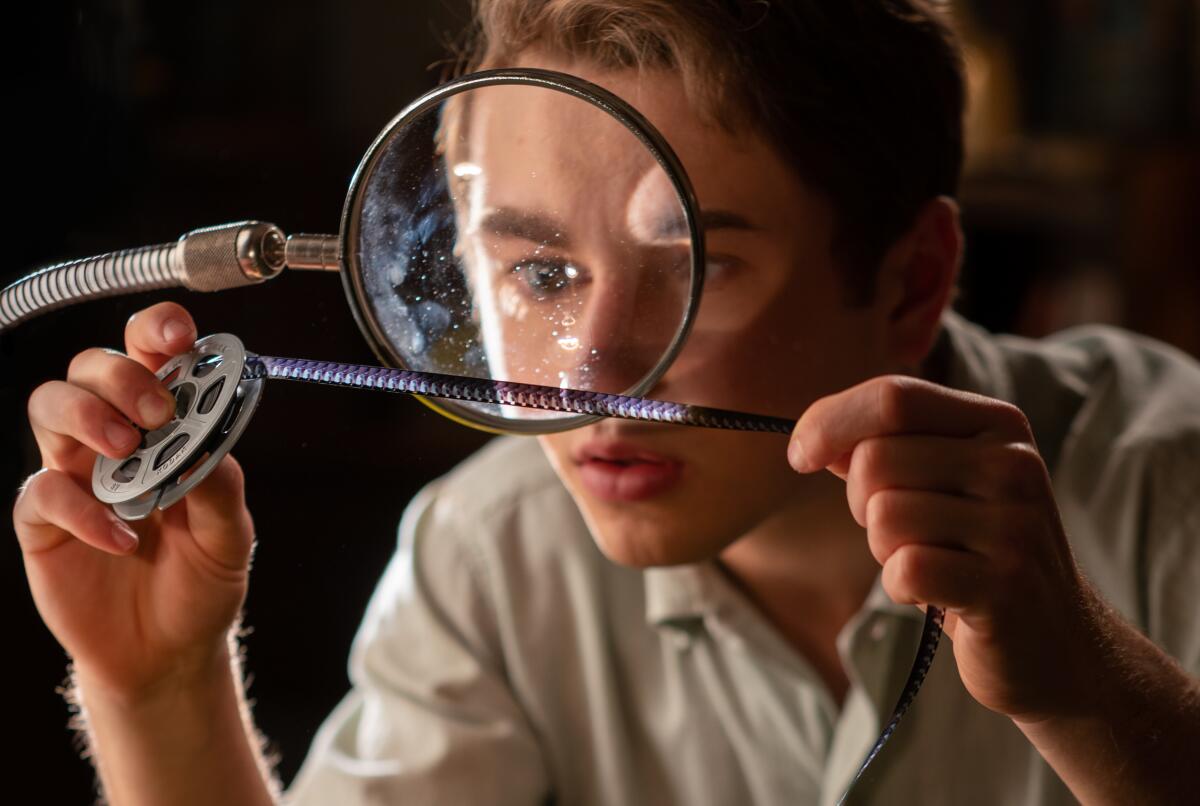
For a filmmaker to use his command of the medium to dramatize his younger self’s command of the medium might have seemed, in other hands, hopelessly self-congratulatory. (And it does come close in one near-climactic scene that hinges on Sammy’s next-level talent — a moment that doesn’t convince, ironically, because the dialogue has to spell out what the camera and the actors don’t make entirely clear.) But there’s also a humility at work here, as well as a deep understanding of human frailty that feels like the opposite of arrogance. The most powerful moments in “The Fabelmans” unfold sans self-consciousness or formal gimmickry, which is fitting, since the most important lesson that Sammy learns about the movies is that, while they can spin elaborate lies, they can also tell the truth. His camera can both distort and reveal reality, catching details that the human eye misses and bringing them, unsparingly, into the light.
The most wrenching of those details concern Mitzi’s slide into depression and denial, and Williams’ performance — one of her many recent remarkable turns as an artist, from “Fosse/Verdon” to Kelly Reichardt’s upcoming movie “Showing Up” — is an astonishing, almost unbearable reservoir of emotion. Leading with a red-lipped grin, fluttering gestures and a velvety croon in her voice, she gives a big, risky swing of a performance, but also a surpassingly delicate one. When she plays the piano or, in one almost too lovely sequence, dances in the light of a car’s high beams, Mitzi seems gloriously lost to the world around her, lost in the art that she loves. But then reality pulls her back, and in the cruel disorientation that follows, you see that the loss is really hers.
Burt’s practical, sturdy resignation makes him no less poignant a figure, and Dano precisely conveys the struggle of a man whose gentleness complements, but cannot assuage, his wife’s unquenchable lust for life. And if “The Fabelmans” is a record of the end of a marriage, it’s also an attempt at reconciliation — between a child and his loving, well-meaning, painfully human parents, and also between the twinned legacies that those parents bequeathed him. Sammy may be an artist and a dreamer like his mother, but he is no less his father’s son, having inherited Burt’s technological vision (Hollywood’s forthcoming blockbuster revolution will demand nothing less) and more than a little of his steady, calming spirit.
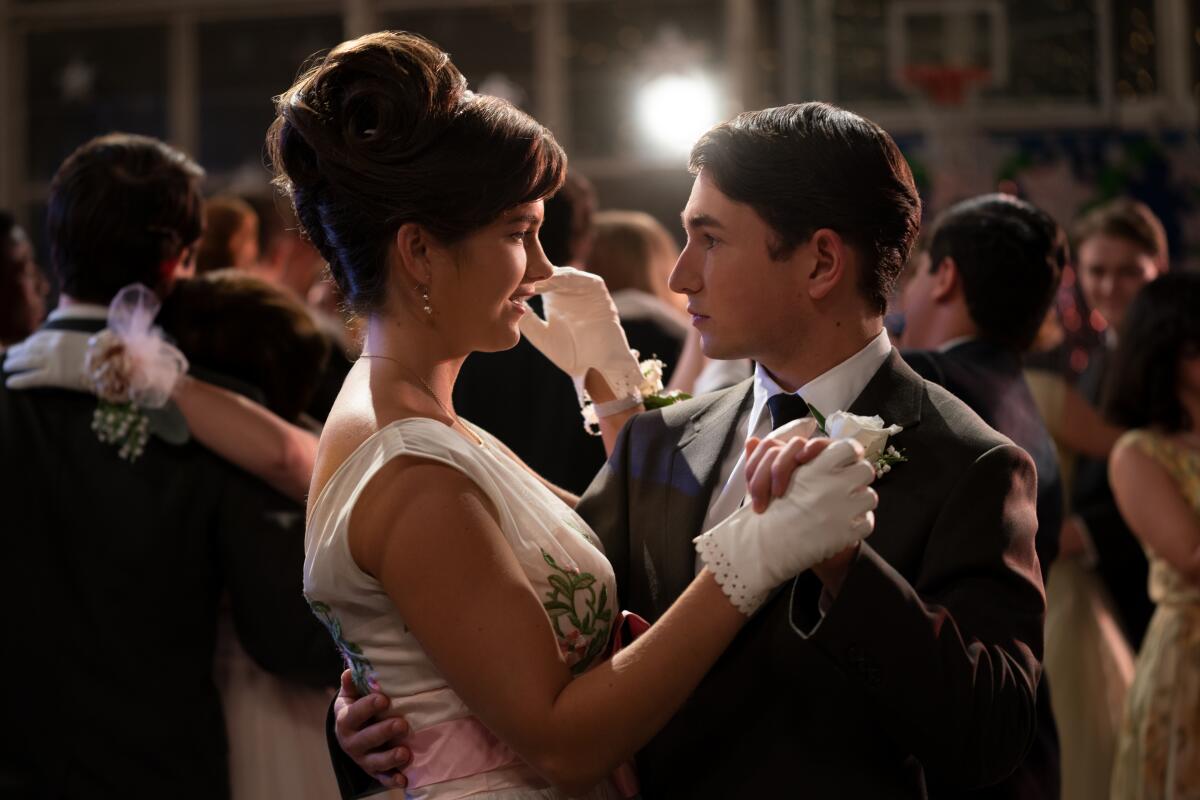
Did it all happen this way? Were his parents these people? You might as well ask if Sammy’s real-life counterpart really went steady with an overzealous Catholic girl (Chloe East), if he got his nose bloodied by an antisemitic jock (Sam Rechner) or if things played out exactly as they do in the movie’s deliriously entertaining finale. Such curiosity is only natural, even if it plays into an old canard about art — and especially movies — inspired by real life, that their accuracy is a direct measure of their truth.
Like all great storytellers, Spielberg knows the value — the beauty — of artifice and embellishment, as well as the permeability of truth and fiction. “The Fabelmans” is as slick, transporting and painstakingly orchestrated as anything in his filmography, and also as funny, stirring and implacably sad. What makes it personal isn’t that you believe everything in it happened exactly as you see it. It’s how vivid and enveloping it feels as it’s happening in front of you, and how recognizable and bittersweet an ache it leaves behind.
‘The Fabelmans’
Rated: PG-13, for some strong language, thematic elements, brief violence and drug use
Running time: 2 hours, 31 minutes
Playing: Starts Nov. 11 at AMC the Grove 14, Los Angeles, and AMC Century City 15
Watch L.A. Times Today at 7 p.m. on Spectrum News 1 on Channel 1 or live stream on the Spectrum News App. Palos Verdes Peninsula and Orange County viewers can watch on Cox Systems on channel 99.
More to Read
Only good movies
Get the Indie Focus newsletter, Mark Olsen's weekly guide to the world of cinema.
You may occasionally receive promotional content from the Los Angeles Times.
